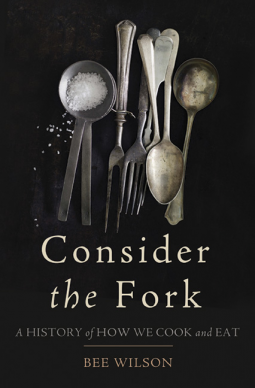
Consider the Fork
A History of How We Cook and Eat
by Bee Wilson
This title was previously available on NetGalley and is now archived.
Send NetGalley books directly to your Kindle or Kindle app
1
To read on a Kindle or Kindle app, please add kindle@netgalley.com as an approved email address to receive files in your Amazon account. Click here for step-by-step instructions.
2
Also find your Kindle email address within your Amazon account, and enter it here.
Pub Date Oct 09 2012 | Archive Date Nov 27 2012
Perseus Books Group | Basic Books
Description
Since prehistory, humans have striven to tame
fire and ice, and have braved the business ends of mashers, scrapers, and
razor-sharp knives-all in the name of creating something delicious (or, at
least, edible). The technology of food matters even when we barely notice it is
there, but in recent years kitchen technology has become increasingly elaborate
and eye-catching, transforming the old-fashioned home kitchen into a bristling
stainless steel laboratory. Far from a new development, however, the modern
kitchen is only the most recent iteration of an ancient lineage of food
technology, as acclaimed food historian Bee Wilson reveals in Consider the
Fork.
Many of our technologies for preparing food have remained
strikingly consistent for thousands of years. The Greeks and Romans already had
pestles and mortars. Knives-perhaps mankind's most important gastronomic
tool-predate the discovery of that other basic technology, fire. Other tools
emerged quite suddenly (like the microwave, whose secrets were unlocked during
radar tests conducted during World War II) or in fits and starts (like the
fork, which had to endure centuries of ridicule before finally gaining
widespread acceptance). For every technology that has endured, others have
fallen by the wayside. We no longer feel the need for andirons and bastables,
cider owls and dangle spits, even though in their day these would have seemed
no more superfluous than our oil drizzlers and electric herb choppers.
The evolution of food technology offers a unique window into
human history, and Wilson blends history, science, and personal anecdotes as
she traces the different technologies that have shaped-or slashed, pounded,
whisked, or heated (and reheated)-our meals over the centuries. Along the way
she reveals some fascinating facts-showing, for instance, how China's cuisine, its
knives, and its eating utensils are all the product of the country's
historically scarce fuel supply. To conserve energy, chefs rendered their
ingredients quick-cooking by using large, multi-purpose chopping knives to
reduce food to small, bite-sized morsels. This technique, in turn, gave rise to
the chopstick, which cannot cut. What's more, the discovery of the knife-in
Asia and elsewhere-was likely what gave humans our distinctive overbite. Before
humans learned to fashion knives out of sharpened rocks, many of us cut our
food by clamping it in our front teeth, which gave us perfectly aligned rows of
teeth.
But Wilson shows that, far from being adventurous innovators,
cooks are a notoriously conservative bunch, and only adopt new technologies
with great reluctance. The gas range revolutionized cooking when it was first
introduced in the 19th century by promising to end "hearth deaths," a constant
danger for women wearing billowing, flammable clothing. But indoor gas
cooking-safer and more efficient-was nevertheless greeted with widespread
suspicion when it was first introduced. Many chefs feared it would taint their
food or poison their guests. The same hold true for the refrigerator, which was
initially condemned as an unnatural technology that risked changing the
fundamental "essence" of food. Perhaps the one exception to this technophobia,
says Wilson, was the egg beater, new patents for which proliferated so
astonishingly in late 19th-century America.
In this fascinating history, Wilson reveals the myriad
innovations that have shaped our diets today. An insightful look at how we've
changed food and how food has changed us, Consider the Fork reveals the
astonishing ways in which the implements we use in the kitchen affect what we
eat, how we eat, and how we relate to food.
Bee Wilson is a food writer, historian, and author of three previous books, including Swindled: The Dark History of Food Fraud, from Poisoned Candy to Counterfeit Coffee, which was named a BBC 4 Book of the Week. Wilson served as the food columnist for the New Statesman for five years, and currently writes a weekly food column for The Sunday Telegraph's Stella magazine. She was named BBC Radio's Food Writer of the year in 2002, and was a Guild of Food Writers Food Journalist of the Year in 2004, 2008, and 2009. Wilson's writing has also appeared in The Sunday Times, The Times Literary Supplement, The New Yorker, and The London Review of Books. Wilson earned her PhD from Trinity College, Cambridge and also attended the University of Pennsylvania on a Thouron Award fellowship.
Available Editions
| EDITION | Hardcover |
| ISBN | 9780465021765 |
| PRICE | $26.99 (USD) |
| PAGES | 336 |



